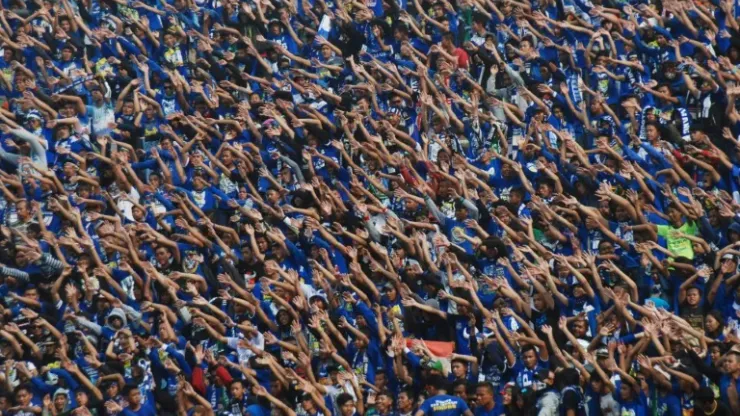Jakarta (AFP) – From deadly fan beatings to teams being transported to matches in armoured personnel carriers, Indonesia is fast gaining a reputation as Asia’s most violent football nation.
Last weekend 23-year-old Persija Jakarta fan Haringga Sirla was clubbed to death by supporters of arch-rival Persib Bandung.
His murder once again highlighted the Southeast Asian country’s decades-long struggle with hooliganism and led to the suspension of its top-flight Liga 1.
Sirla was the 70th Indonesian football fan to die in match-related violence since 1994, or about three deaths annually, according to figures from football watchdog Save Our Soccer.
His brutal murder, captured in shaky mobile phone footage and posted to Youtube, saw rival supporters using rocks, sticks and planks to beat the young man outside Bandung’s main stadium before a match.
Police said they have detained 16 people in connection with the killing.
It was the latest in a string of violent incidents between fans of the two clubs whose rivalry is so fierce that Persija supporters have previously been urged not to attend matches in Bandung, some 150 kilometres (93 miles) southeast of the capital.
The Football Association of Indonesia (PSSI) suspended play indefinitely following Sunday’s incident, vowing a crackdown.
But critics are quick to point out Indonesia has been here before — and little has changed.
“The penalties aren’t enough,” Dex Glenniza, managing editor of website Pandit Football, told AFP. “Teams have not learned from the past.”
– ‘They’re just criminals’ –
While fan violence may not be as deadly as in some Latin American countries including Brazil, where football is akin to a religion, hooliganism has long been a feature of the Indonesian game, observers said.
Die-hard supporters of top teams have become notorious for unsavoury behaviour, with violent chants the norm at matches and hardcore fans blindly clinging to long-standing inter-club feuds.
The security situation has become so dire that players from big-name rivals like Persib and Persija are sometimes transported to matches in armoured personnel carriers.
Many hooligans have little interest in what’s happening on the pitch and care more about squaring up against rivals, Glenniza said.
“This is not about football anymore — they’re just criminals,” he told AFP.
Yana Umar, the director general of Viking Club Persib (VCP), a fan club with 100,000 members, described Persib as “a culture” with close ties to the Sundanese ethnic group native to the area.
He struggled to pinpoint the origins of his club’s feud with Persija — who he described as “enemies” — but the unemployed father of four deplored Sirla’s killing.
“It’s barbaric,” he said in an interview.
“No matter how crazy you are about football, a person’s soul, their life is worth far more.”
Putting an end to the violence, however, seems to be out of the grasp of Indonesian authorities.
Beefing up law enforcement, stadium security and cleaning up league management have all been touted as possible solutions.
Some have floated more radical ideas, including deducting points from clubs or playing matches in empty stadiums.
Football analyst Akmal Marhali said clubs with violent supporters must be sanctioned, and he questioned whether Indonesia was ready to restart play.
“PSSI has to punish the clubs properly,” he said.
“If we have to, maybe we should have a moratorium on football until there’s no more violence.”
– Crisis-hit league –
While it has a low international profile, Indonesia has attracted some Premier League players, including former Chelsea star Michael Essien and Tottenham Hotspur midfielder Didier Zokora.
But Indonesian football has been beset by other problems over the years, including poor management, corruption allegations and foreign players dying after going unpaid and being unable to afford medical care.
An explosive row between the domestic association and government prompted FIFA to ban Indonesia from international competition in 2015. The ban lifted last year.
In July, Indonesian fans hurled stones and bottles at the visiting Malaysian team after the home side lost their semi-final match in the AFF Cup Under-19 football match.
The most recent violence, however, has touched a national nerve, with both Indonesia’s sports ministry and President Joko Widodo demanding that the association tackle the problem.
Football authorities have pledged to review security procedures among its 18 top-flight clubs, fans and the league operator.
It also promised to consult with FIFA and the Asian Football Confederation.
Yet, many are still sceptical of positive change.
“Uproar about deaths in football is like a mushroom in the rainy season — it only lasts a month or two before it dies down,” Marhali said.
200+ Channels With Sports & News
- Starting price: $33/mo. for fubo Latino Package
- Watch Premier League, Women’s World Cup, Euro 2024 & Gold Cup
The New Home of MLS
- Price: $14.99/mo. for MLS Season Pass
- Watch every MLS game including playoffs & Leagues Cup
Many Sports & ESPN Originals
- Price: $10.99/mo. (or get ESPN+, Hulu & Disney+ for $14.99/mo.)
- Features Bundesliga, LaLiga, Championship, & FA Cup
2,000+ soccer games per year
- Price: $5.99/mo
- Features Champions League, Serie A, Europa League & Brasileirāo
175 Premier League Games & PL TV
- Starting price: $5.99/mo. for Peacock Premium
- Watch 175 exclusive EPL games per season






